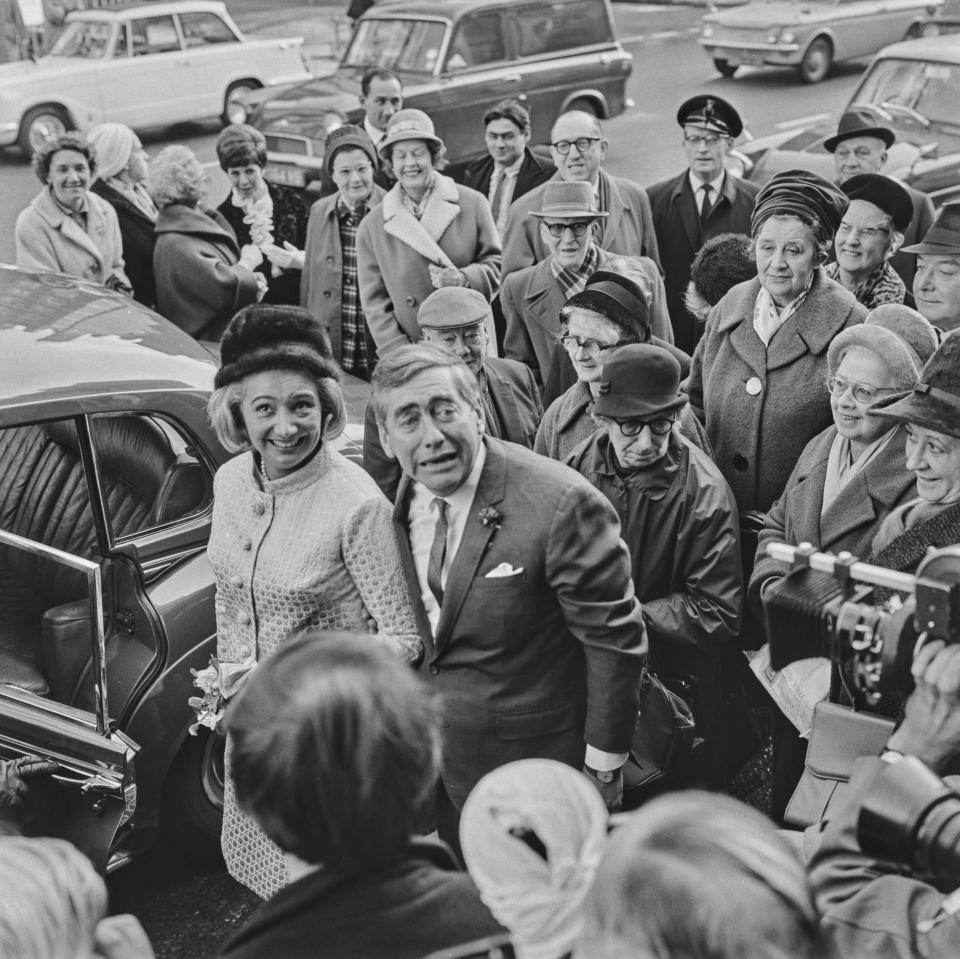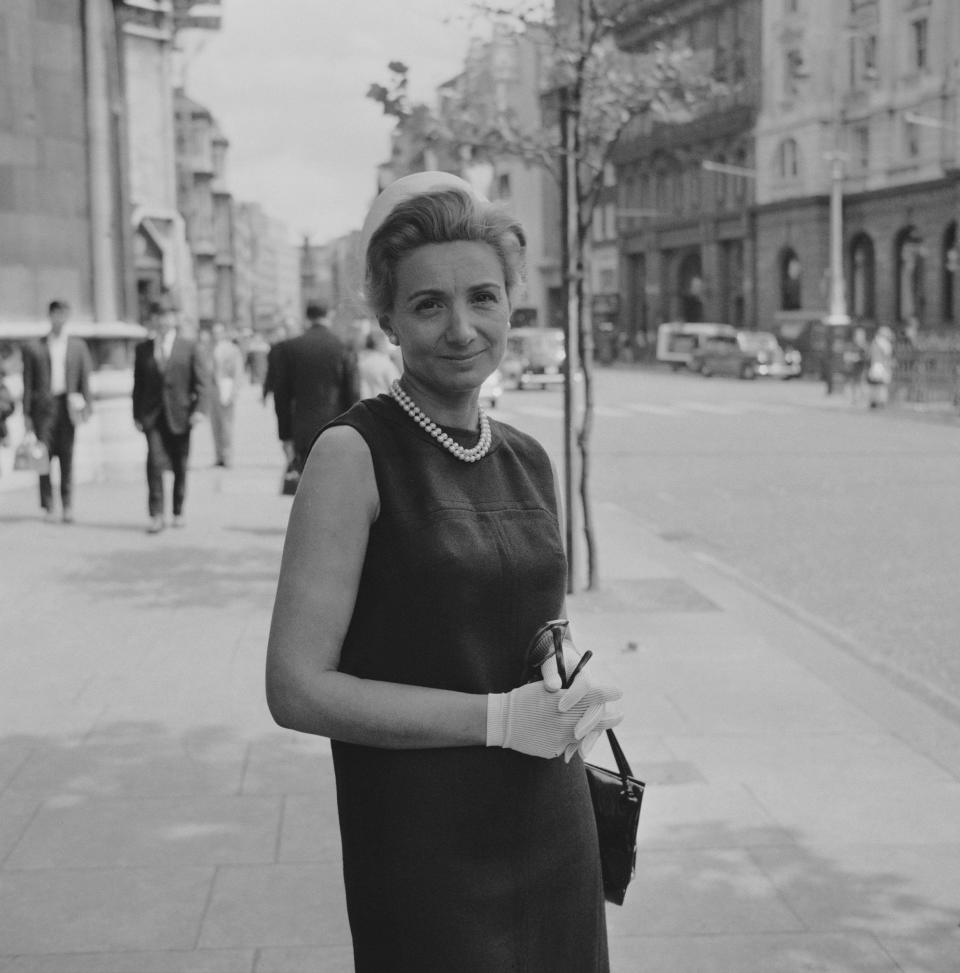Freddie Ross Hancock, publicist with a string of star clients who was forever linked to her doomed ex-husband Tony Hancock – obituary

Freddie Ross Hancock, who has died in New York aged 92, was an ambitious young publicist when she became the mistress and later the second wife of Tony Hancock, then struggling to rescue his reputation as one of Britain’s most popular comedians.
Their marriage was all too brief – within a matter of months Hancock had run off with Joan Le Mesurier, the wife of his friend, the actor John Le Mesurier – and was formally ended three days before Hancock killed himself aged 44 with barbiturates and alcohol in Australia in 1968.
As the Telegraph noted, Freddie Hancock had tried everything to stop her husband drinking, only to be rewarded with a barrage of abuse.
Throughout her 11 years with Hancock, Freddie strove to shore up his self-belief. But if her efforts to shock him out of his alcoholism were extreme – she attempted suicide several times, overdosing on Hancock’s pills – they were just as unavailing. When she tried to keep him away from the drink, he beat her. When he begged forgiveness, she always granted it. In the end she could do and take no more.
Sober, Hancock was kind, gentle and thoughtful. But, as she recalled, “when I got between him and the bottle, he’d lash out.” The first time he struck her, he broke her nose with a karate chop and perforated her eardrum.
When he took her to hospital, Freddie was so upset that she telephoned a restaurant and ordered 24 salt beef sandwiches and Chinese food for 12 to be shared between every patient on the ward, charged to Hancock’s account.

Their engagement was announced in November 1964 with champagne at the Mayfair Hotel. When, out of the blue, Hancock announced that he was going back to his wife, Freddie fled to the Savoy and took an overdose. At Christmas Hancock threw her out of his flat without her keys and wearing nothing but a coat.
When he checked into a sanatorium in Surrey to dry out, she stayed in a nearby hotel and visited him every day. Making a second attempt on her life, Freddie still stood her ground when her parents begged her to make a clean break with him.
Early in 1965 Hancock flew to Hollywood, hoping to break into the American market, and was offered third billing on a Disney spoof western, The Adventures of Bullwhip Griffin. But Freddie had to fly out to his rescue when word of his drunken advances towards the wife of another actor reached the studio and they replaced him in the film.
In 1966, just months after their wedding, Freddie returned to her parents and refused to accept Hancock’s calls. He moved to Australia, but failed to recapture the success of his earlier years. In 1968 she filed for divorce on grounds of adultery. Three days after she was granted the decree nisi, Hancock killed himself.

Freddie Hancock later moved to New York, where she became a marketing consultant in the entertainment industry. She would occasionally watch a video of her favourite episode of Hancock’s Half Hour: “The Ladies Man” (1960). “When I see him doing that ridiculous dance with Arthur Mullard, then I remember Tony without his faults. I think to myself, ‘You can still make me laugh, Anthony Aloysius St John Hancock.’ ”
The daughter of a Jewish bookmaker, Freda Ross was born on April 7 1930 in north London and educated at Kendrick and South Hampstead high schools for girls, and Regent Street Polytechnic, where she took a commercial course. She learnt the public relations business working for the Holland America cruise line for two years, after which she joined the Universal Film Corporation of America as assistant head of publicity in the UK.
In the early 1950s she formed her own PR company, Freda Ross Associates (the sole associate in fact being her mother), representing artists such as Benny Hill, Dick Emery, Bob Monkhouse, Terry Scott and Hugh Lloyd. She met Tony Hancock in 1954 when she was 24 and visiting Blackpool to organise advance publicity for the Ted Heath band. Hancock, then 40, was performing with Vera Lynn and Jimmy Edwards.
When he lumbered into the bar wearing a sweater over his jacket, glass in hand, “he looked a bit like a bloodhound, with his heavy brow and hangdog expression. I told him that if I had a talent like his I wouldn’t hang my head low, I would hold my head high.” Her first present to him was a pair of cuff-links engraved with those words.
She persuaded Hancock to take her on as his publicist, and within three weeks she had cleared a two-year backlog of his fan mail, ordered him to buy six new suits and to get his hair cut. One early errand was to fly to Paris, where he was on holiday with his wife, with extra spending money. Freddie Ross occasionally found herself written into his radio scripts as a clairvoyant called Madame Freda or a stray character called Fred.

In 1959 Freddie and Hancock began an affair, although he was still married to his first wife, Cicely, but they only began to live together openly in 1963. In the meantime Freddie Ross continued to build up her PR business, which she ran from her flat in Dorset Square, with clients ranging from the Steptoe actor Harry H Corbett to the violinist Max Jaffa.
Hancock was an eccentric lover, sometimes sitting in his chair watching television with an old slipper balanced on his head. They were married in December 1965. Originally planned for Hawaii, the ceremony took place in London. Jealous as ever, Hancock spent his wedding eve watching Freddie’s flat for signs of a final fling. The next year he left her for Joan Le Mesurier.
The year after Hancock’s death she underwent major surgery and later travelled while working on assignments unconnected with public relations.
In November 1988 she organised the 80th birthday celebrations given in New York for the British broadcaster Alistair Cooke by the BBC, securing the musical services of Leonard Bernstein and James Galway (who forgot to bring his flute) and a personal video greeting from President Ronald Reagan.
She was appointed MBE in 2002 for fostering Anglo-American cultural links.
As founder and vice-chairman of Bafta East Coast, she was the prime mover in the appointment as honorary CBE of the now-disgraced mogul Harvey Weinstein for services to the British film industry. Weinstein was stripped of the honour in 2020 following his conviction for rape and sexual assault.
Freddie Hancock was appointed vice-chairman of the American arm of the Royal Television Society.
In 1969, with the journalist David Nathan, she wrote a biography, Hancock.
A warm, volatile woman of great nervous energy, always immaculately turned out, Freddie Hancock admitted that her life had been defined by her status as Hancock’s wife and then his widow: “It’s a bit like being a pantomime character. Like being the widow Twankey. Mostly it’s an honour, sometimes it’s a real bugger. Everyone remembers Tony with affection and I’m glad about that. But life with a genius isn’t about the hilarity, the on-stage applause. The reality wasn’t like that.”
She never remarried.
Freddie Ross Hancock, born April 7 1930, died November 27 2022

 Yahoo Movies
Yahoo Movies 